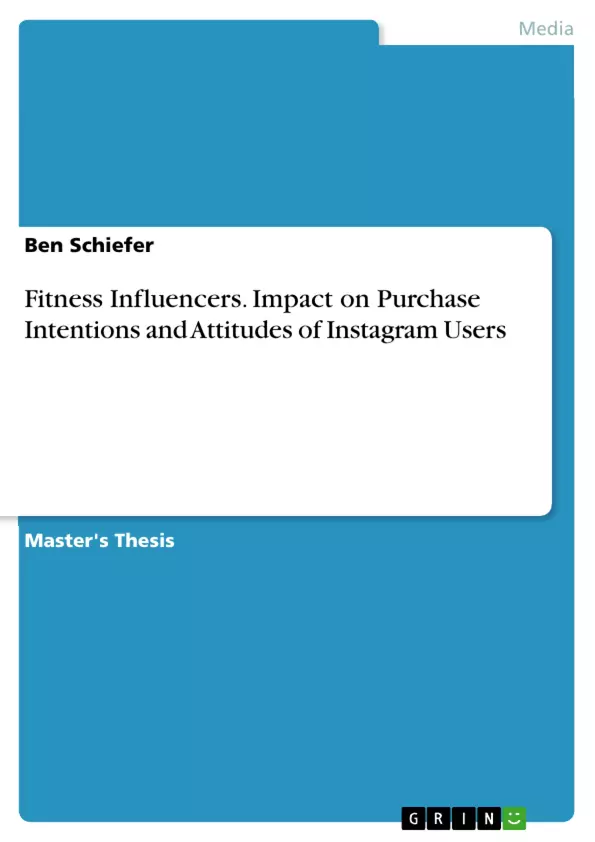This master thesis empirically assesses the impact of the fit between digital fitness influencers and promoted brands on attitudes and purchase intentions of Instagram users. The study identifies attitudes toward source – both source credibility and source trustworthiness, attitudes towards ads and attitudes towards brands as important constructs to measure the advertising impact on attitudes.
Based on a review of the existing literature regarding digital influencers and the concept 'fit', an experiment with two conditions was conducted via independent online surveys. They were carried out to members of online fitness forums and communities and fitness groups on social network sites. Data collected from 109 respondents in survey A and 110 in survey B was analyzed and tested using unpaired 2-sided tests.
The empirical study reveals the relevance of influencer-/brand fit. The results confirm that the impact on all tested constructs is significantly more positive for the test group exposed to the survey including a post of a digital fitness influencer with a high perceived influencer-/brand.
The findings require further confirmation in other settings and industry sectors before they can be generalized, but offer helpful new insights to better allocate efforts and resources to effectively manage the collaboration with digital influencers. A high influencer-/brand fit serves as a key driver for advertising effectiveness of influencer marketing.
Inhaltsverzeichnis (Table of Contents)
- Introduction
- Relevance, research questions and objectives
- Course of investigation
- Conceptual framework: influencer marketing
- Origins, goals and classification in the scientific context
- Types of digital influencers
- Social media platforms
- Blogs and micro blogs
- Online forums and communities
- Social networking sites
- Media sharing platforms
- General information
- Success factors and limitations of influencer marketing
- Overview of success factors and limitations
- Influencer-/brand fit
- Digital fitness influencers in Germany
- German fitness industry
- German fitness influencers on Instagram
- Purchase decision process and advertising impact of influencer marketing in the German fitness industry
- Influencing factors on purchase behavior
- S-O-R-model overview
- Promotional posts on Instagram as stimuli
- Reference groups
- Attitudes
- Purchase decision process
- Phases of purchase decision processes
- Purchase intention
- Advertising impact
- Model overview
- Measuring advertising impact: attitudes and purchase intention
- Empirical analysis
- Objectives and research methodology
- Operationalization of constructs
- Results
- Discussion
- Recommendations and further steps
- Summary and outlook
Zielsetzung und Themenschwerpunkte (Objectives and Key Themes)
This master thesis explores the impact of digital fitness influencers on attitudes and purchase intentions of Instagram users. Specifically, it aims to analyze the influence of the fit between the digital fitness influencer and the advertised brand on advertising effectiveness. The study investigates the importance of influencer-/brand fit as a driver for positive attitudes towards the source, the advertisement, and the brand itself.
- The impact of digital fitness influencers on attitudes and purchase intentions
- The role of influencer-/brand fit in advertising effectiveness
- Measuring the influence of influencer-/brand fit on attitudes towards the source, the advertisement, and the brand
- Exploring the relevance of influencer-/brand fit for the German fitness industry
- Identifying implications for managing collaboration with digital influencers
Zusammenfassung der Kapitel (Chapter Summaries)
The thesis begins with an introduction, outlining the relevance, research questions, and objectives of the study. It then delves into the conceptual framework of influencer marketing, exploring its origins, goals, types of influencers, and relevant social media platforms, particularly focusing on Instagram. The chapter then examines the success factors and limitations of influencer marketing, emphasizing the concept of influencer-/brand fit. Chapter 3 examines the German fitness industry and the role of digital fitness influencers on Instagram. Chapter 4 explores the purchase decision process and advertising impact of influencer marketing in the German fitness industry, focusing on influencing factors on purchase behavior, attitudes, and purchase intentions. The chapter also examines the role of promotional posts on Instagram as stimuli and reference groups. The fifth chapter presents the empirical analysis of the study, outlining the objectives, research methodology, operationalization of constructs, results, and discussion. Chapter 6 focuses on recommendations and further steps, and the final chapter summarizes the findings and provides an outlook on future research directions.
Schlüsselwörter (Keywords)
The thesis focuses on the impact of digital fitness influencers, particularly in the context of influencer marketing. It explores the influence of influencer-/brand fit on advertising effectiveness, examining attitudes and purchase intentions of Instagram users. Key concepts and terms include: influencer marketing, digital influencers, fitness, attitudes, electronic word-of-mouth, purchase intention, advertising impact.
Frequently Asked Questions
How do fitness influencers affect purchase intentions?
The study shows that influencers impact purchase intentions by building source credibility and trustworthiness, which positively affects attitudes towards the brand.
What is "influencer-brand fit"?
It refers to the perceived congruence or match between the digital influencer's persona and the brand they are promoting.
Why is a high fit important?
A high fit serves as a key driver for advertising effectiveness. The results confirm that a good match leads to significantly more positive attitudes and higher purchase intentions.
Which social media platform was studied?
The empirical study focused specifically on Instagram users within the German fitness industry.
What is the S-O-R model in this context?
The Stimulus-Organism-Response (S-O-R) model explains how promotional posts (stimuli) affect the internal states of users (organism) to produce a behavioral outcome (response, like a purchase).
- Quote paper
- Ben Schiefer (Author), 2018, Fitness Influencers. Impact on Purchase Intentions and Attitudes of Instagram Users, Munich, GRIN Verlag, https://www.grin.com/document/1338004



